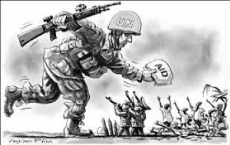
Email: ZYVC057@live.rhul.ac.uk
Total Article : 213
About Me:I'm a graduate student studying International Criminal Law and first started writing for King's News almost 4 years ago! My hobbies include reading, travelling and charity work. I cover many categories but my favourite articles to write are about mysteries of the ancient world, interesting places to visit, the Italian language and animals!

As states become ever more globalised, debates on whether any form of intervention in another country is justifiable or even plausible are reaching their apex. The term ‘humanitarian intervention’ has been repeatedly used by state leaders worldwide to either unite citizens to defend human rights overseas or to manipulate citizens into fighting a war with hidden reasons. We will explore both concepts, respectively using the liberal and realist approaches we discussed in the first article, and after you can decide for yourself.
Intervention is commonly the use of military forces or alternative means to control and govern a population in another country. There are many types of interventions but humanitarian interventions pose by far the most concern as they touch upon moral arguments justifying interfering in foreign state affairs. Professor Ramesh Thakur best describes this form of intervention as “the use of military force on the territory of a state without its consent with the goal of protecting innocent victims of large scale atrocities” in which atrocities are crimes against humanity such as large scale killings and ethnic cleansing. Before resorting to intervention the global community tends to try all other tools such as diplomatic pressure and sanctions; this is also because if intervention fails to solve the issue there is no plan B, no other extreme option. The UN is considered to be the legitimate actor of humanitarian intervention.
Argument For Humanitarian Intervention:
Humanitarian intervention is always linked, as mentioned previously, to moral arguments with the protection of human rights placed as a central political objective. All human should have the fundamental protection of basic human rights and states have an obligation to reassure this is always possible; also if we don’t help victims who will?
Argument Against Humanitarian Intervention:
Others question whether human rights can actually be applicable worldwide or if they are simply a principle of the western world. Many also believe states should not be so involved in global affairs when their own soldiers risk their lives for saving those of citizens across the globe.
From a realist point of view states don’t intervene primarily due to humanitarian concerns but for their own interests to be fulfilled. States will therefore use and abuse the humanitarian rights discourse and rhetoric to pursue their own political aims and tend to apply human rights selectively; where there is an additional motive for intervention states will push for humanitarian intervention. From a liberal point of view states join together to create a sound global web of connections and as such feel the need to collaborate more as a unit, which is why states feel obliged to aid victims across the globe.
Humanitarian intervention principally became an issue in the 1990s with cases such as Somalia, Kosovo and Rwanda. Why not research these three cases and see whether intervention was justifiable, then tell us what you think!
IMAGE: http://ballandalus.files.wordpress.com/2013/05/humanitarian-intervention.jpg

0 Comment:
Be the first one to comment on this article.